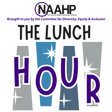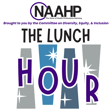
Episode 6: An Introductory Conversation on the Evolving Landscape of DEI in Health Professions
In this episode, NAAHP CDEI was excited to welcome Andrea Price-Carter from the AAMC. Andrea serves as the Director of Health Equity Advocacy and Government Relations. We intentionally didn't take a lot of time to explain some base concepts and programs, bills, and legislative change. We have decided to provide resources for you to explore key parts of our conversation here:
Overview of HR-1 (Big Beautiful Bill): https://www.bestcolleges.com/news/what-college-students-need-to-know-one-big-beautiful-bill/
Overview of the Educate Act: https://www.aamc.org/advocacy-policy/washington-highlights/educate-act-introduced-rep-greg-murphy-md
HPNEC Advocacy Actions: https://www.hpnec.org/advocacy-activities
AAMC Washington Highlights: https://www.aamc.org/advocacy-policy/washington-highlights
Join AAMC Action: https://aamcaction.org/
Additional Resources from Andrea:
- Health Professions and Nursing Education Coalition: https://www.hpnec.org/
- Breakdown of HRSA Title VII and Title VIII Programs: https://www.hpnec.org/what-are-hrsa-title-vii-and-title-viii-programs
- Comparison of FY 2025 budget allocations vs. proposed FY26 budget: https://www.hpnec.org/funding-updates
- AAMC Action Workforce Programs issue page: https://aamcaction.org/issues/workforce-programs/
If you have additional questions for Andrea or for us with the NAAHP CDEI, please feel free to submit your questions here:
https://forms.office.com/r/ZJ41jGyNSq

